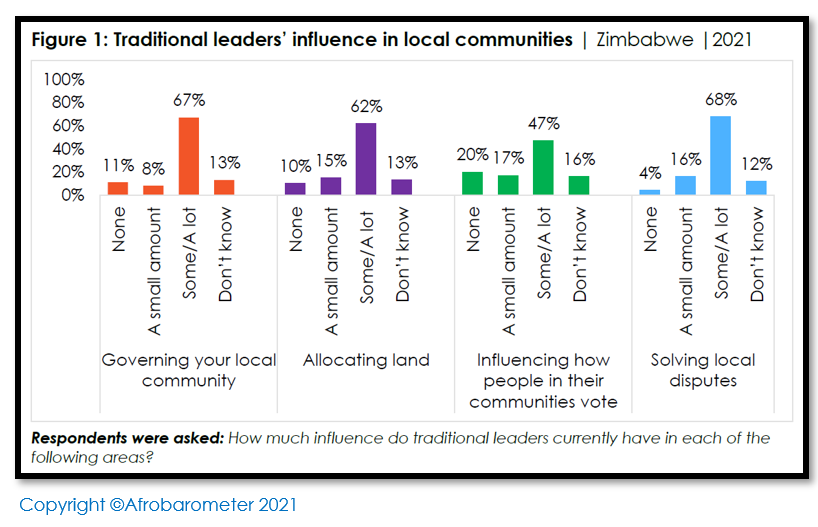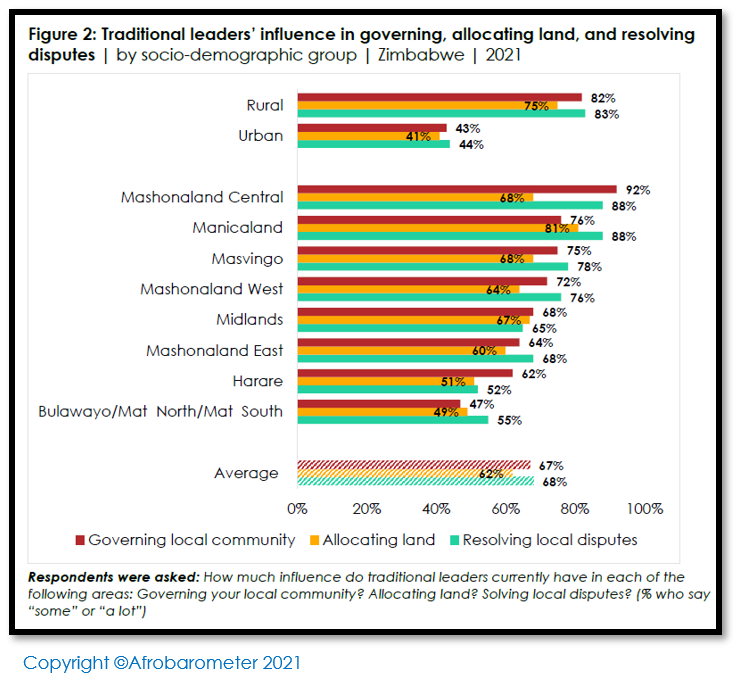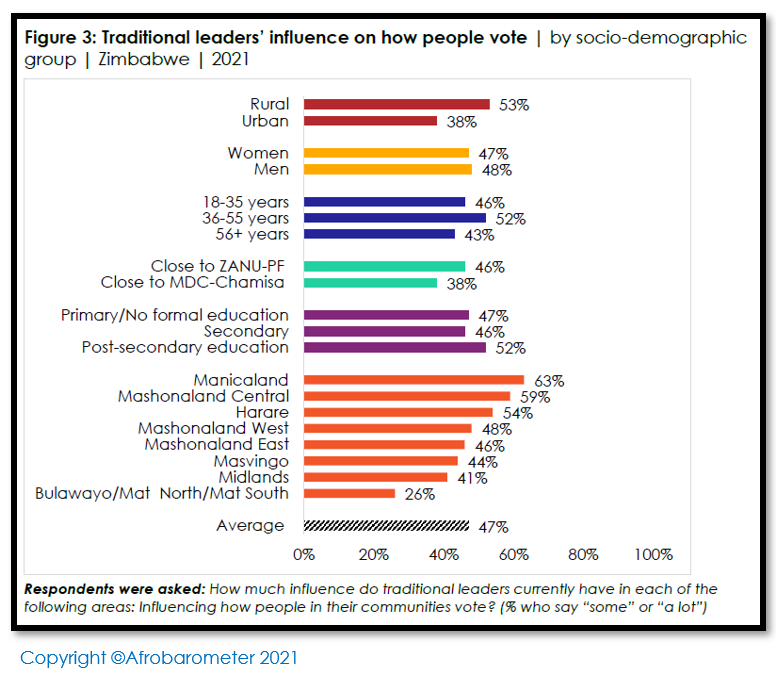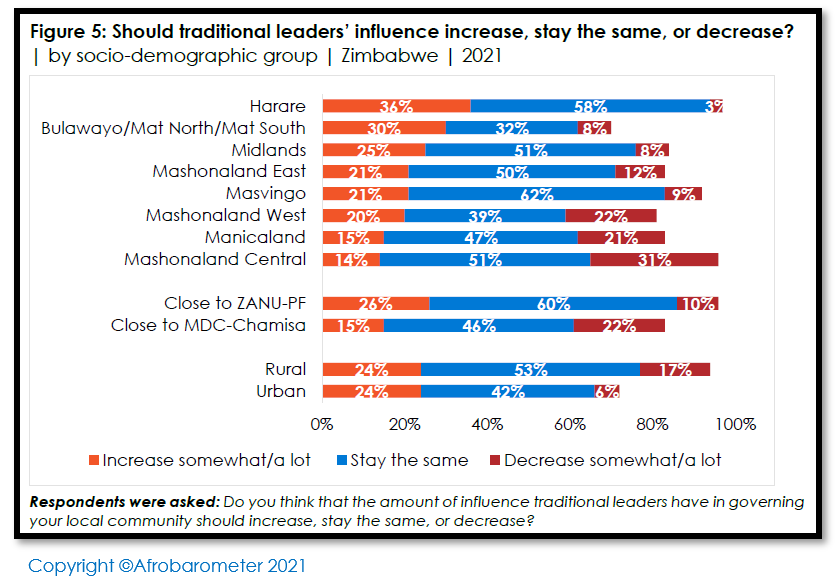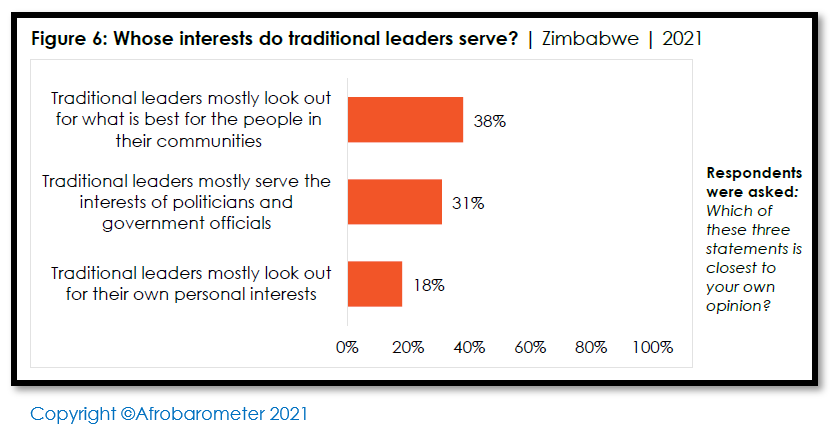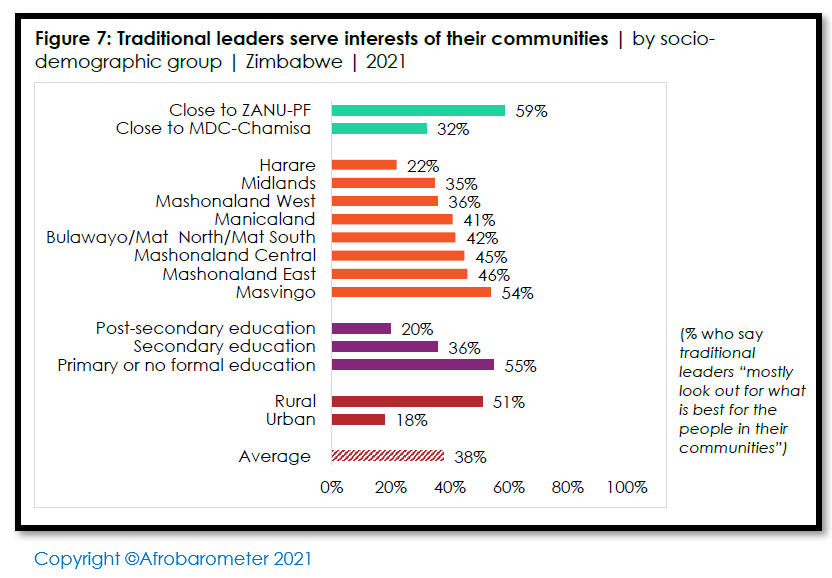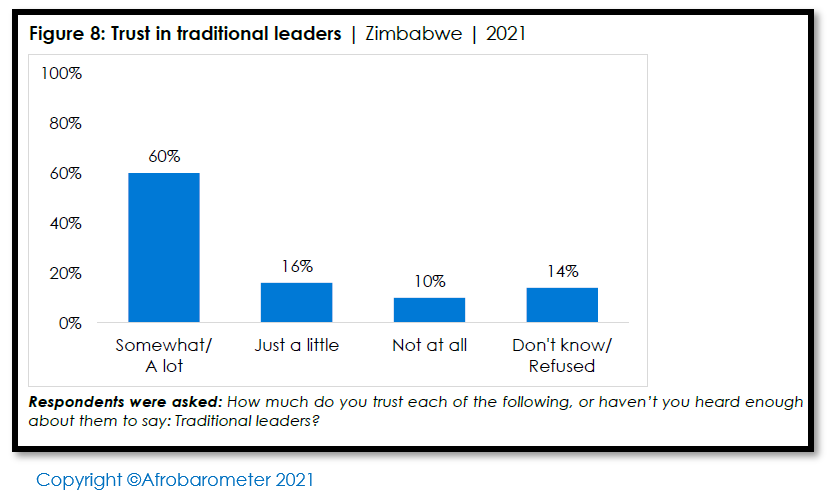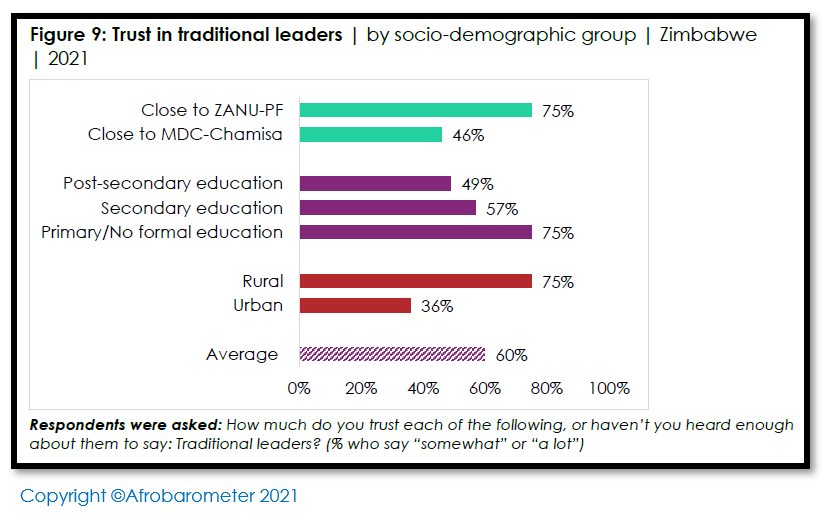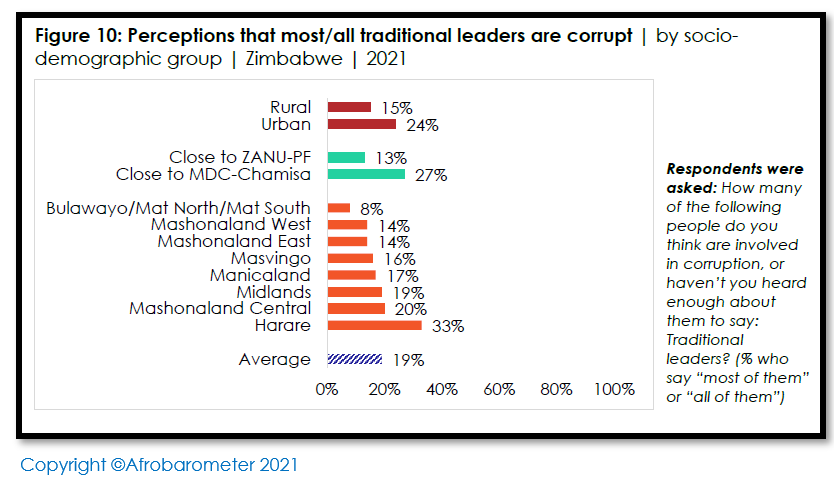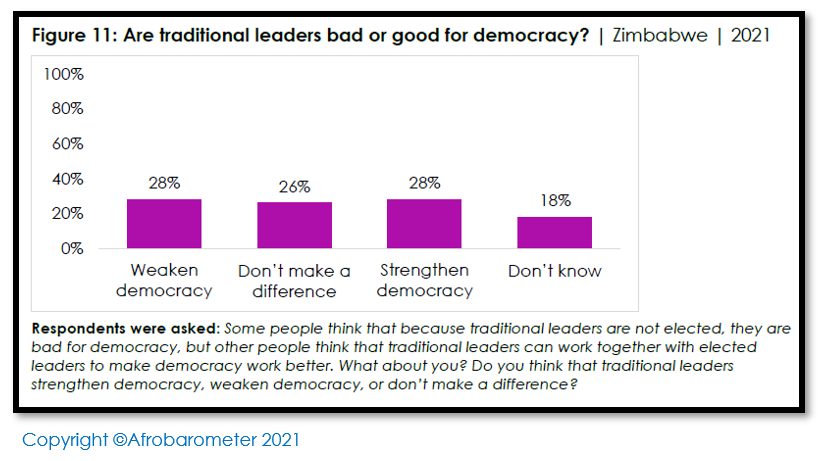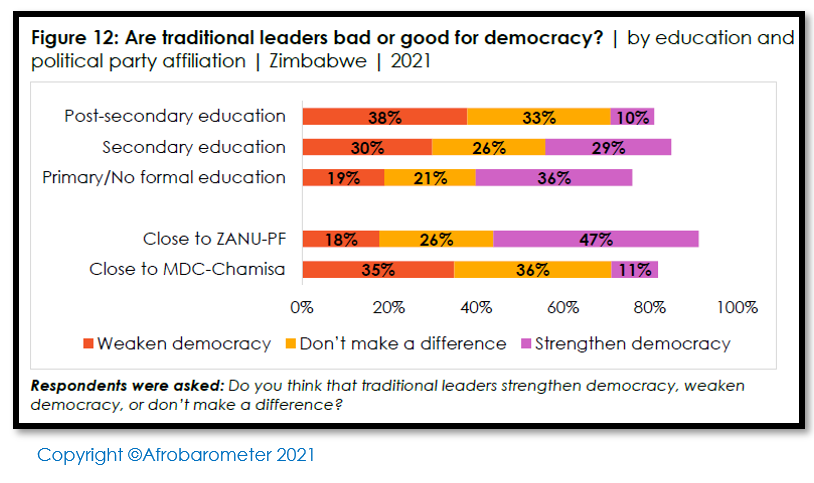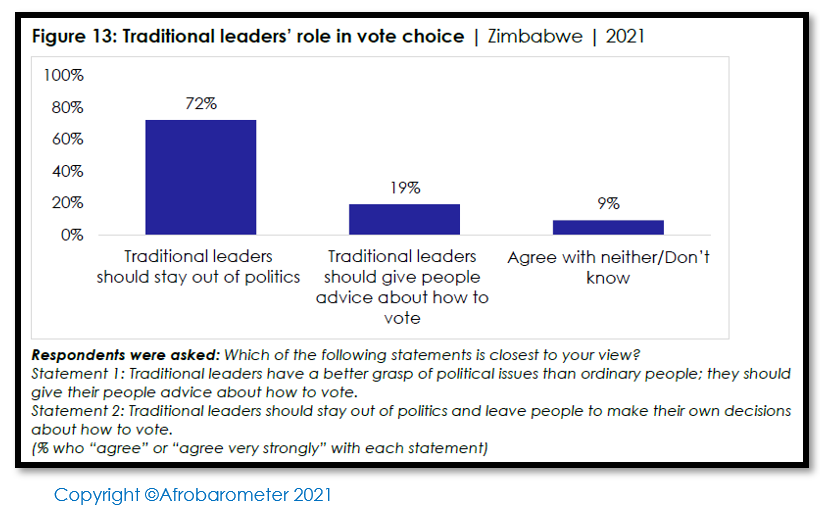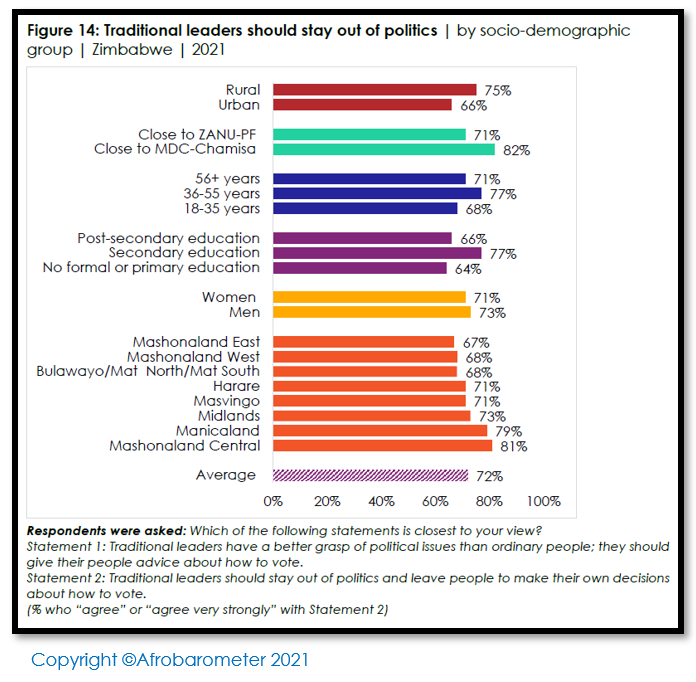Home >
Mashonaland Central >
Traditional Leaders in Zimbabwe are still seen as influential, but in all provinces citizens overwhelmingly want them to stay out of politics
Traditional Leaders in Zimbabwe are still seen as influential, but in all provinces citizens overwhelmingly want them to stay out of politics
Background: Masvingo High Court rules that traditional leaders should stay out of partisan politics
On 16 May 2018 Justice Garainesu Mawadze of the Masvingo High Court issued a judgement banning all traditional leaders from partisan politics and the President of the Chiefs Council – Chief Fortune Charumbira, and the National Chiefs Council (representing all 282 Chiefs in Zimbabwe) was banned and prohibited from making further political statements on their involvement or allegiance to ZANU-PF on any public platform.[i]
Conducting of campaigns on behalf of the ruling party by traditional leaders (chiefs, head persons or village heads) was declared unconstitutional and a violation of the right not to be treated unfairly in a discriminatory manner on the basis of political affiliation.[ii]
Who are Afrobarometer?
Afrobarometer conducts non-partisan research surveys across many African countries - round 8 surveys for 2019-2021 were conducted in 34 countries on the African continent to provide reliable data on African experiences and their personal evaluations of democracy, governance and quality of life.
In Zimbabwe the Afrobarometer team led by the Mass Public Opinion Institute (MPOI), interviewed 1,200 adults in face-to-face interviews in the language of the respondent’s choice during April 2021. A sample of this size yields country-level results with a margin of error of +/-3 percentage points at a 95% confidence level.
This report is from Dispatch No 469 of 3 August 2021 that was led by Stephen Ndoma. The graphs below and the conclusions drawn are all from their report.
The role of traditional leaders in Zimbabwe
Zimbabwe’s Constitution and the 1988 Traditional Leaders Act define the role of traditional leaders. They include:
- promoting and upholding the cultural values of their communities
- facilitating development and administering communal lands
- protecting the environment
- resolving disputes in their communities
- exercising any other functions conferred or imposed on them by an act of Parliament.
Why the need for this survey on traditional leaders?
Zimbabwe’s legal system and the Constitution bar traditional leaders from being members of any political party, participating in partisan politics and furthering the interests of any political party or cause.
However despite the above, traditional leaders in Zimbabwe have been accused of dabbling in politics, typically in support of the ruling ZANU-PF party and in restricting any political gatherings of opposition political parties, particularly in rural areas. Opposition parties say ZANU-PF buys their loyalty through subsidized vehicle-purchase schemes and electrification of their homes.
Most Zimbabweans thought traditional leaders have influence in the governance of local communities (67%) the allocation of land (62%) and the resolution of local disputes (68%) Significantly less than half say they are influential in how people in their communities vote (47%)
Significantly more citizens from rural areas (75% - 83%) were influenced by the views of traditional leaders than in urban areas (41% – 44%)
The highest support for traditional leaders as influencers came from Mashonaland Central (68% - 92%) the lowest from Bulawayo and Matabeleland (47% - 55%)
Below half (47%) say traditional leaders have significant influence on how people in their communities vote with more support in rural areas (53%) than in urban areas (38%) and less support from those that support opposition parties (38%) Manicaland citizens were strongest in their confirmation of how much traditional leaders affect citizens’ votes (63%); again Bulawayo and Matabeleland were the lowest (26%)
Just under half of Zimbabweans think the level of influence that traditional leaders exert should stay the same (49%); most don’t want it to increase (24%) or decrease (13%).
Those citizens most in favour of traditional leaders’ influence staying the same were from Masvingo (62%) supported ZANU-PF (60%) and lived in a rural area (53%)
Zimbabweans were somewhat divided in their views on whose interests traditional leaders serve – citizens in their communities (38%) politicians and government officials (31%) or their own personal interests (18%).
Those citizens who most thought their traditional leaders did not serve their communities were opposition supporters (32%) lived in Harare (22%) and had a post-secondary education (20%) Overall support for the proposition that traditional leaders mostly look out for what is best for people in their communities was low (38%)
Most Zimbabweans majority (60%) trust their traditional leaders “somewhat” or “a lot.” (60%) just 10% did not trust them at all.
Trust for traditional leaders mostly came from ZANU-PF supporters (75%) who had primary or no formal education (75%) and lived in rural areas (75%)
Only a minority of Zimbabweans thought traditional leaders were involved in corrupt activities (19%) with the highest number maintaining they are corrupt coming from Harare (33%) and the lowest in Bulawayo and Matabeleland (8%)
Zimbabweans were split on the question of whether traditional leaders are good or bad for democracy: 28% believe they make democracy stronger, 28% say they weaken it, and 26% say they don’t make a difference.
However ZANU-PF supporters generally had stronger views that traditional leaders strengthened democracy (47%) Those with post-secondary education were the largest group who thought traditional leaders weakened democracy.
Zimbabwe citizens had deep-seated views that traditional leaders should keep out of politics (72%) and refrain from giving advice on how to vote. This view that the people should decide themselves how to vote came over loud and clear.
Perhaps surprisingly Zimbabweans in rural areas felt strongest that traditional leaders should stay out of giving political advice (75%) Less surprising this view was more widely supported by opposition party supporters (82%) than ZANU-PF supporters (71%) Most Zimbabwe provinces agree that they want their traditional leaders to stay out of politics. (67% - 81%)
For more unbiased research on Citizens views throughout Africa go to: www.afrobarometer.org/online-data-analysis
References
Afrobarometer. Stephen Ndoma. Zimbabweans see traditional leaders as influential but want them to stay out of politics. Dispatch No. 469 | 3 August 2021
Zimbabwe Lawyers for Human Rights. 17 May 2018. High Court bans all Traditional Leaders from Politics. https://kubatana.net/2018/05/17/high-court-bans-traditional-leaders-poli...
[i] Zimbabwe Lawyers for Human Rights: Justice Garainesu Mawadze ruled further that:
All traditional leaders who include chiefs, head persons or village heads as provided in section 280(2) of the Constitution, must not be involved in partisan politics as this is a violation of the right to a free and fair election as provided in section 67 (a) of the Constitution.
[ii] Zimbabwe Lawyers for Human Rights: Elton Mangoma and Renewal Democrats of Zimbabwe Party were represented by Tinotenda Shoko, Lizwe Jamela and Martin Mureri of Zimbabwe Lawyers for Human Rights (ZLHR)
When to visit:
n/a
Fee:
n/a
Category:
Province:

